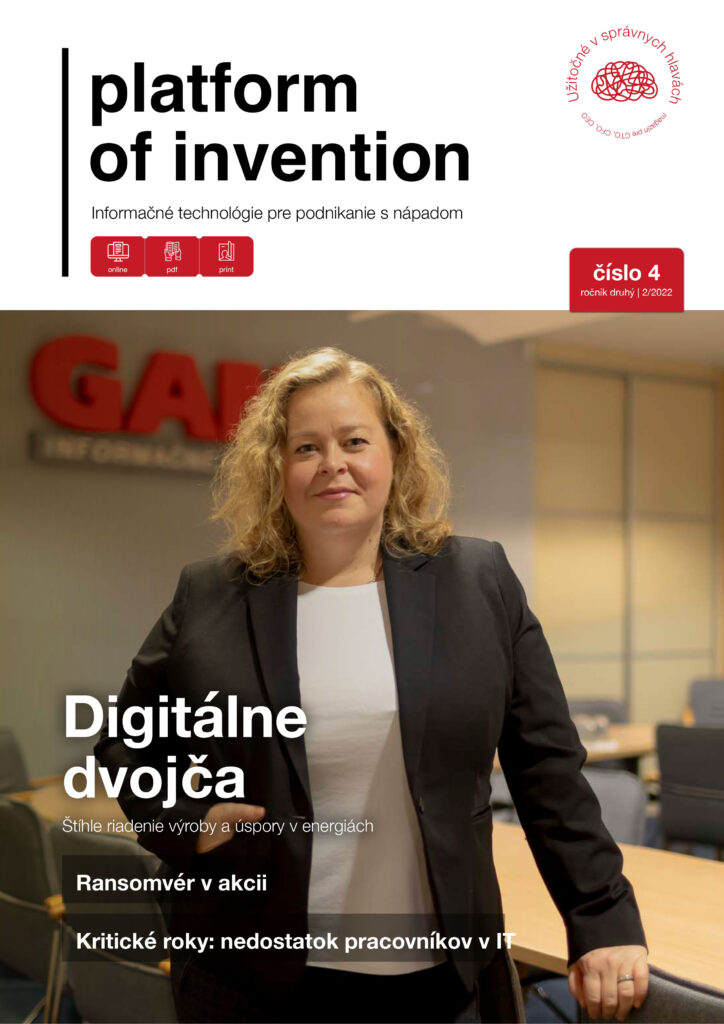A successful company needs people who are dedicated to their work, and IT services that make their daily work easier.
In the following article we will tell the story of the company Adecco Slovakia, one of the TOP 3 recruitment agencies in Slovakia, which has been operating on the market since 2002. “We provide our clients with a comprehensive service, recruitment of employees, payroll processing, consultations,” says director Ivana Heretik Vačoková. “We have a wide network of branches and work with a large database of over 50 thousand candidates. Our job is to help job seekers find suitable jobs on the one hand, and on the other hand to search for talent for companies, to find the right candidate for a specific client’s position.”
Recruitment agencies must be as flexible as possible. Ensuring accurate and fast recruitment requires flexible dealings with all parties involved. That’s why Adecco Slovakia uses modern Microsoft 365 technology, enabling the development of collaboration in work teams and the use of the highest standards of data security. We talked to Marek Šefčík, IT specialist at Adecco Slovakia, about the intention behind the implementation of M365, why they put emphasis on setting up security policies, and what they consider to be the biggest benefit of the service.
In the article you will learn:
- Why use M365 services
- How they adapted
- Where they want to go
The reasons for implementing a Microsoft 365 environment vary. In the story of Adecco Slovakia, it was the independence of the company, one of the TOP 3 in its industry, from its foreign mother. How do you evaluate the implementation from the perspective of an IT administrator?
It wasn’t a switch to something new, the implementation was mainly a migration. The infrastructure of the “mother” was built as a hybrid solution (combination of own on-premise infrastructure with cloud infrastructure). Realistically, what Adecco Slovakia needed was to get all the data from the parent company into the new environment, to itself. That was the gro of the migration.
The company’s independence also entailed the termination of IT support and everything related to IT. The migration had to be handled within a set period of time.
Migration was necessary precisely to preserve our history Data. Since we work with a lot of clients, candidates and their data, it wasn’t just about migrating Office and Microsoft stuff. It was about making sure the transition was as smooth as possible. And that can be achieved by not going into something completely new. That means ensuring all the necessary data is available, systems are up and running and overall IT governance is in place in a short space of time. This also involved security settings, as the policies of a multinational corporation differ from what a medium or large company needs in terms of both IT requirements and what users have and need. As a result, the migration brought about a working collaboration of cloud services and in-house infrastructure.
Naturally, however, it has also touched on the area of security. This, like all IT services, had been provided by the “parent company” for some time. At a time when the risk of cyber-attacks is increasing day by day, it was crucial to answer the question: How to secure corporate data and protect the users themselves at the same time?
From the very beginning, Adecco has placed great emphasis on protecting not only its know-how, but also its identities and endpoint devices. The procurement of Microsoft Business Premium licenses fully met these requirements. This tool I perceive positively not only at work, but also privately. The settings help protect users’ end devices. They identify what’s happening on which computer, detecting a possible attack based on behaviour. The tool alerts me as an admin to what we need. I really like to use Group Policy, recommendations to protect against information leakage (DLP policies – data loss prevention), data plotting, GDPR issues, and most importantly it restricts the user minimally, it can still work to its full extent. For example, they will restrict him by not being able to use USB keys, which could be inappropriate and problematic from a security perspective. Not only for his PC, but at the same time for the whole company.
As an administrator, I appreciate that I don’t even have to have a real computer on my desk. Joining an Azure domain applies set policies, and when I plug a USB stick into the PC and want to upload either a resume or a person’s private data stored on a private computer, I need admin permission to do so. I’m not just going to take it away. When I email it, there is a log on the server, so it’s a bit safer there. We can track it down if something happened by accident, of course it always depends on how well the staff are briefed, how well the guidelines are.
It’s important for your business that you access services on the Microsoft 365 platform in a unified environment that complies with security standards, including GDPR. This is likely to make your job much easier and increase data security and oversight. Have you noticed any major changes in the way you work post-migration – moving on from your mother?
Some colleagues do. They were the ones who were using Office 2016 until then. But when they found out what collaboration features exist in M365, it definitely helped them in their work. The stumbling block in migration can be time-consuming, so it’s worth contacting a suitable partner who is experienced enough in M365 implementation to recommend a combination of services or a suitable licensing package for the business.
That is, OneDrive and the magic of sharing.
This is a very useful sharing feature because a person can open OneDrive on another device, authenticate with their account, and pull up what they need. Both the device and what has happened on OneDrive is logged. Realistically this is a great thing even on backup workstations, which I see as the essence of OneDrive. To give an example: if a person’s computer “dies”, something unforeseen happens, they log in with their Microsoft account on another device, and it immediately works on. OneDrive can hold files both locally and in the cloud. Autosafe is a great feature of the M365, and employees are aware of it as well.
Excel files in on-premise storage have limitations. A user cannot access a report on-premise if another colleague already has it open. He has to wait until he closes the document.
Yes, for example A file long since closed by a user was still inaccessible to others. It was enough that someone didn’t close an open Excel file, and others were able to open it read-only, or needed the admin to “unblock” the file. In this case, changes made were often not saved or copies of the same file were created. That’s why I came up with the suggestion of sharing the reports to everyone they are intended for. I explained to my colleagues the benefits of this.
For example: we share a document, when you edit something in the report, I can see it right away, you can see which field I’m in for real, so we don’t edit the same thing at the same time. You can see the history of the files there, if someone deletes it, we go back. We’re working as quietly as five or fifteen at a time as we need to.
Is there anything you want to move on to? Are you considering SharePoint?
Once the migration was complete, I started pushing the sharing to other teams from my position as an IT specialist. Our goal is to build a strong company-wide SharePoint, with the understanding that we want to use it to its full potential, from approval through power vending machine, everything one can imagine. One useful feature is SharePoint Sheets. They contain reports, lists, j it’s a big challenge. It will be about linking a complex agenda with impact on multiple systems.
Mobility always makes an admin’s job easier.
Sure. We use Teams as a communication channel, we use it mainly as Instant Messenger. Anyone who needs a group can create one. We have no restrictions applied.
We have the ability to work in a web browser and it works. The flexibility of Office is pushed much higher. The added services we have received in the M365 packages help us a lot. For me personally, for example, in situations where someone contacts me with a question through Teams , if I can look in the spreadsheet for something that doesn’t work there. I open it immediately on my phone, just as I would on a computer, and solve the problem as well via mobile.
As an administrator, I really appreciate and use the Admin Center for my phone, an application where I get push notifications about a certain problem and I can react immediately.
The M365 is used by almost the whole world – it’s mainstream. We all then adapt to the functionality they currently set or offer.
When we hire someone, we assume that the candidate knows the basics, has seen Word, Excel. Surprisingly, despite the fact that this has been taught in schools for the last few years, young people come to interviews with minimal knowledge of the basic Office suite of services or Windows as such. However, by going mainstream, there is still less chance of a person coming to an interview with absolutely zero knowledge than if we were using some open source, which they should start working in after joining.
What Microsoft has excellent are forums, a great thing when it comes to using MS products. I open Google and search for Microsoft forums, Microsoft documentation, go line by line, and look up possible solutions or causes. I get to what I need, or identify the recommendation that best fits the problem.
Microsoft is a highly “user friendly” thing. You are automatically logged in as a user to the tools and applications you are supposed to use: OneDrive, Teams, Outlook and more. Admin does the initial setup, the initial setup, users get computers that already have software pre-installed, are checked, and have the content of what’s supposed to be there. And straight away it works. It is intuitively guided to use those functionalities that are available in the applications. It doesn’t mess things up, if it doesn’t know something, it has support. He can navigate the basics and learn as he goes along. Gathers experience and has documentation available. Even if he doesn’t have knowledge of EN, he can find the answers in the SK tutorials.
From the statements of the IT specialist from Adecco Slovakia, whether in the position of an administrator or user, it is clear that he is satisfied with Microsoft 365. He is also satisfied with the benefits provided by the tools and applications, as well as with the documentation support and features for users. Of course, it is a broad ecosystem, there are various extensions, add-ons for data collection, Power BI, and other things. By making it mainstream, the admin has a lot less to worry about with users.
Navigating the wide range of services may not be easy, given that Microsoft 365 is a living, ever-evolving ecosystem, where you need to know the possibilities and perceive the innovations. But the key is to know your employees’ needs, design and teach them how to use work-simplifying apps, and thereby protect the entire company.








